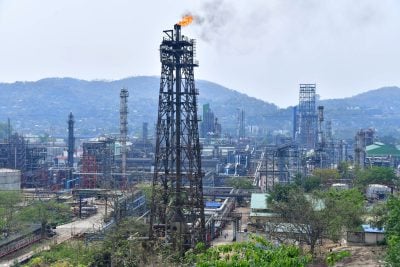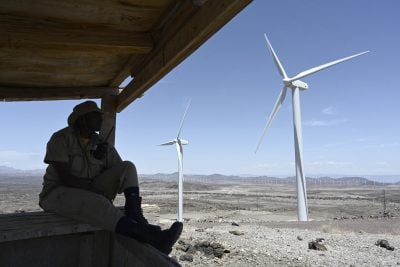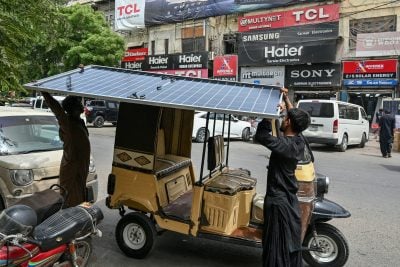With its abundance of clear skies and sun, and its limited electricity infrastructure, it is little wonder that Kenya is emerging as a big market for alternative sources of power such as solar energy.
Less than half of Kenya’s population is on the grid, and millions have to buy and burn kerosene for power, leaving a huge opportunity for innovative technologies and systems that can generate affordable and clean electricity.
One company tapping into this market, and lighting up swathes of rural East Africa in the process, is the Nairobi-based firm M-Kopa Solar, which has made impressive strides in recent years.
M-Kopa was founded by Nick Hughes, who created the M-Pesa system while at telecommunications giant Vodafone, and Jesse Moore, an American specialising in technology ventures in emerging markets. They both quit their jobs in 2010 “to start up a company without much of a business plan”. But their breakthrough came when they realised that the average Kenyan ‘off-grid’ household was spending more than $200 per year on kerosene, a dangerous and expensive way to generate basic electricity.
“Kenyans spend a lot of money every day on off-grid energy solutions,” says Moore. “They are tiny payments…but over the course of a year or five years the amount is huge. If you factor in the number of Kenyans living off-grid then you have a billion-dollar business opportunity.”
M-Kopa thus spotted a huge gap, which the company’s founders thought they could fill with solar, a renewable and clean source of power that simply requires users to have the right technology to generate their own electricity.
The company’s signature product is simple – an 8W system with three lights, a phone-charging port and a chargeable solar radio. The equipment comes with a two-year warranty, though Moore stresses that the kit’s normal lifespan is four to five years.
However, to make the solution viable, M-Kopa has had to be innovative in another way in order get around a potentially big stumbling block. While buying the $180 solar panel kit saves users money in the long run, many rural households would struggle to save up that kind of money for a one-off purchase. And it was here that M-Kopa looked to M-Pesa.
Most Kenyans don’t have bank accounts, but millions do use M-Pesa, a mobile payments system that allows customers to make transfer money through their mobile phones. M-Pesa is at the heart of the M-Kopa business model.
“We were clear that mobile payments would be a railway upon which new products and services could be delivered because of the ability to collect small amounts of money from hundreds of thousands of customers,” says Moore.
Rather than buy the solar kit outright, M-Kopa allows customers to put down a $35 deposit. Then, through M-Pesa, the user pays the company the equivalent of 43 US cents for the next 365 days until they have transferred the full $180 to own the equipment outright.
As first glance, the proposition of handing over a $180 kit for $35 and no other collateral sounds risky, especially as most M-Kopa customers have no credit history and may live on very limited budgets. But despite this, M-Kopa’s collection rate has been high: 92% of customers meet their daily payments, while over 40,000 customers have now bought their solar system outright.
“Our customers say that you don’t feel the pinch,” says Moore. “I’m actually buying benefit so there’s an immediate gratification, and I’m saving the money that I would have spent on kerosene. We should be getting back 95% of the money.”
Part of the success story of M-Pesa has been in building people’s access to credit, and M-Kopa plans to contribute to this too by submitting credit scores. “One of the great off-takes of our business is that we take people with little or no credit history and give them access to financial services,” says Moore.
A bright future
M-Kopa launched in October 2012, partnering up with Safaricom, the telecoms firm which operates the 17m accounts in Kenya’s M-Pesa network. Two and a half years later, 180,000 households across Kenya, Tanzania and Uganda now use M-Kopa products, and 500 new sets are now being sold each day by M-Kopa’s 1,000-strong network of agents dotted around the region: 600 employees work out of its cheerful headquarters in Nairobi’s bubbling Kilimani district.
But Moore thinks that the recent growth spurt is just the beginning. “Our ambition is to sell a million sets in 2017,” he says.
Despite the rapid growth, M-Kopa is currently concentrating on Kenya, Uganda and Tanzania, but its founders see no reason why the ‘pay as you go’ solar energy concept cannot work elsewhere.
Indeed, given that electricity shortages are experienced across Africa, M-Kopa has vast opportunities to expand into other countries and regions. The World Energy Outlook estimates that nearly $400bn of investment will be needed to achieve universal access to electricity across Africa by 2030, and the combined capacity of sub-Saharan Africa is roughly equivalent to that of Spain. In other words, energy grids aren’t going to catch up with demand any time soon.
“There is tons of scope for this and that’s why we’ve been called by people in Ghana who want to establish this service, and we are actively looking to license this technology,” says Moore.
Benjamin Fox
Want to continue reading? Subscribe today.
You've read all your free articles for this month! Subscribe now to enjoy full access to our content.
Digital Monthly
£8.00 / month
Receive full unlimited access to our articles, opinions, podcasts and more.
Digital Yearly
£70.00 / year
Our best value offer - save £26 and gain access to all of our digital content for an entire year!
 Sign in with Google
Sign in with Google 


